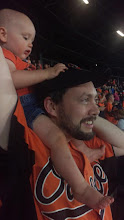 Here's a question that lingers in the wake of nearly five years of steroid and performance-enhancing drug suspensions, reports, tell-all books, accusations, and whatever else is swirling out there.
Here's a question that lingers in the wake of nearly five years of steroid and performance-enhancing drug suspensions, reports, tell-all books, accusations, and whatever else is swirling out there.Was Rafael Palmeiro telling the truth?
One of the most disillusioning and disappointing experiences I've had as a fan was Palmeiro's fall from grace. He'd been my favorite player during his first stint with the Orioles (1994-1998), when I was coming of age as a baseball fan. I'd been happy to see the team bring him back in the twilight of his career, and even happier when he starting playing like the Rafael Palmeiro I'd remembered in the second half of 2004 and the beginning of 2005. Not only did I have a suddenly-relevant O's team to root for again, I got to watch him cement his place in Cooperstown by collecting his 3,000th hit and drawing ever closer to his 600th home run. Even better, he had provided a lasting image in a Congressional hearing about steroids by pointing his finger squarely at the panel and stating boldly and unequivocally that he had never used steroids, period. He was one of the good guys.
Then, of course, things went downhill in a hurry. In August 2005, he was suspended 10 games for testing positive for steroids - stanozolol, in fact. One of the big ones. Because of his pedigree and his performance in front of Congress, he became a pariah. I watched as the Orioles spiraled deeper into a late season free-fall that cost manager Lee Mazzilli his job. Palmeiro returned and his every move brought more scorn. He famously wore earplugs on the road to try to block out the jeering opposition fans. His play went in the tank, as he had just two hits in twenty-six at-bats after his return. The team shut him down at the end of August, which proved to be an ignominious end to a quietly prolific career.
But worst of all was his flimsy, cowardly excuse. Word leaked out that he had blamed his positive test on a shot he received from teammate Miguel Tejada, at that time the face of the Oriole franchise and the on-field leader of the team. He assumed that it was a vitamin B-12 supplement. Nothing about the accusation made sense. Why would he try to undermine and incriminate a teammate, especially one so prominent? Were we really supposed to believe that a finely-tuned professional athlete who had conditioned his body well enough to play into his forties didn't know exactly what he was putting in his body? And who could actually confuse a harmless vitamin with a potent steroid?
Eventually Rafael Palmeiro faded away, becoming a punchline and a cautionary tale and little else. In the meantime, Miguel Tejada has been implicated in the Mitchell Report as a steroid user and is currently being investigated on federal perjury charges. Knowing what we know now, don't we have to have just a shadow of doubt? Was Palmeiro telling the truth? Was he a victim of a series of improbable and unfortunate circumstances?
It's not very likely. But that's the thing. We don't know for sure, and we almost surely never will. That's one of the things that makes me crazy about the so-called "Steroid Era".


2 comments:
You know, this crossed my mind again reading Durwood Merrill's book about umpiring, written in 1998, I believe. In it, and I wish I had the book in front of me, but it's in the car with my wife, who's working ... she's working, not the book. Anyway, he said that Raffy was one of the nicest and most honest players he'd ever shared a field with. Friendly, genuine and honest. Makes you wonder. I thought he told the truth, always have - the sporte media is a particularly vicious animal starving for raw meat, and very unforgiving. And, ask Warren Moon - they're also not very apologetic when they're wrong ...
I still believe in this country that individuals are innocent until proven guilty. If any government agency believes Rafael used steroids then do an investigation, arrest him, try him and put him in jail. If no agency is able to do that, don't tarnish his name and leave him the hell alone.
Post a Comment